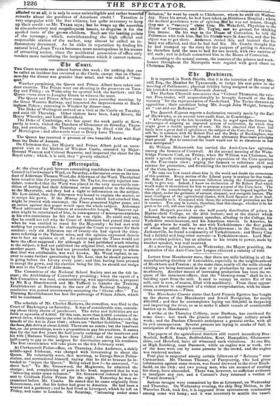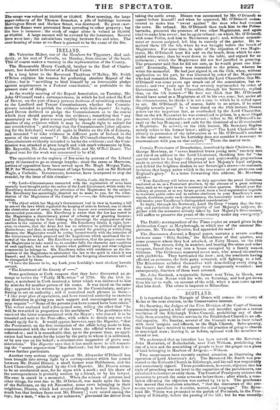Zbe 1tobinus.
It is reported in North Shields, that it is the intention of Henry Mit- calf, Esq., the Member for Tynemouth, to resign his seat prior to the meeting of Parliament ; physical debility being assigned as the cause of his intended retirement.—Newcastle Journal.
The Durham Chronicle announces that "Colonel Thompson, the vete- ran Free-trader, will unquestionably be, brought forward at the first vacancy "for the representation of Sunderland. The Tories threaten an opposition ; their candidate being Mr. Joseph John Wright, formerly an "out-and-out Reformer."
The Ipswich Express reports a declaration recently made by the Earl of Hardwicke, at an annual rent-audit feast, in Cambridge- " After alluding to the late incendiary fires, he urged upon the farmers the advantages of adopting an improved system of cultivation, by which they might grow a double quantity of corn. Be then observed that there had lately been a great deal of agitation on the subject of the Corn-laws. For him- self, he, in common with Sir Robert Peel and the Duke of Buckingham, was opposed to free trade; but he thought that ultimately Free-trade principles must prevail. But he conceived the result would not be so disastrous as had been anticipated."
Sir William Molesworth has carried the Anti-Corn-law agitation among the farmers of Cornwall. At the annual meeting of the Wade- bridge Farmers Club, on Friday, when Sir William was Chairman, he made a speech consisting of a popular exposition of the Corn question in the Free-trade view ; urging the farmers to substitute skill and science for protection, and foretelling the inevitable and speedy repeal of the Corn-laws- " No man can look round about him in the world and doubt the correctness of this position. Every section of the Liberal party is anxious for free trade; Sir Robert Peel and his numerous followers among the Conservatives are ready to give way. Indeed, I know no declaration of Sir Robert Peel which would make it inconsistent for him to propose a repeal of the Corn-laws. The whole of the manufacturing and commercial classes are leagued together for this object, under the guidance of earnest, eloquent, and energetic leaders. The most intelligent of the agricultural classes, with Lord Spencer at their head, are favourable to it. Compared with these, the advocates of protection are few in number. You may be certain, therefore, that this change, whether it be for good or for evil, will soon take place."
Lord Morpeth presided at the half-yearly distribution of prizes in Huddersfield College, on the 20th instant; and at the dinner which followed, he made some pleasant speeches, alluding to the College, his Yorkshire reminiscences and his American travels. In America, he said, go where he would, he met with Yorkshiremen : the first guide of whom he asked the way was a Yorkshireman ; in the Prairies, at Jacksonville, he found a community of Yorkshiremen ; and Henry Clay had a faithful and long-tried servant—a Yorkshirewoman. Lord Mor- peth avoided politics ; but an allusion to his return to power, made by another speaker, was well received.
At a meeting in Leicester, on Wednesday. the Mayor presiding, the deputation of the Anti-Corn-law League obtained a subsidy of 808/.
Letters from Manchester state, that there are mills building in all the manufacturing districts of Lancashire, especially in the neighbourhood of Blackburn and Preston ; at the same time, nearly all the mills already existing are being increased in size or in production by means of new machinery. Another means of increasing production has been the re- quest of the insurance-offices, that the " blowing-room " shall been a building apart from the mill. It used to occupy an entire fiat of the mill, and is now, of course, filled with machinery. From these appear- ances, a dread is expressed of a violent overproduction, with its disas- trous consequences.— Times.
The Manchester Courier states that Lord Francis Egerton has bought up the shares of the Manchester and Irwell Navigation, for nearly 400,0001.; and that he contemplates laying out 300,000/. in deepening and improving the river, so as to make it admit vessels of considerable burden up to Manchester.
A strike at the Thornley Colliery, near Durham, has continued for some time : last week the pitmen of another large colliery struck work; and the Durham Chronicle anticipates a general strike, with all its evil consequences. Several persons are laying in stocks of fuel, in anticipation of the supply's ceasing.
The papers of the agricultural districts still record incendiary fires : Norfolk, Suffolk, Essex, Bedfordshire, Kent, Hampshire, Glocuester- shire, and Hereford, have all witnessed such visitations. At one fire, at High Roothing, near Dutimow, while an engine was at work, two of the hose were cut by some persons in the crowd, and the engine was rendered useless.
Foul play is suspected among certain followers of " Rebecca " near Carmarthen. Mr. Thomas Thomas, of Pantycerrig, who had given information against some rioters, was found drowned in the river Brech- faedd, on the 19th; and two young men, who are accused of stealing his sheep, have absconded. There was, however, no sufficient evidence to inculpate any one, and a Coroner's Jury returned a verdict of "Found drowned."
Serious ravages were committed by fire at Liverpool, on Wednesday and Thursday. On Wednesday evening, the ship Meg Meldon, in the Waterloo Dock, took fire, it is supposed from spontaneous combustion among some wet hemp; and it was necessary to scuttle the vessel.
2111seeaego was-valued at 10000/. or 16,000/. Next morning, the large eager-refinery of Sir Thomas Brancker, a pile of buildings between Harrington Street and Mathew Street, was destroyed. By great exer- tions the flames were prevented from spreading to other property ; but the loss is immense : the stock of sugar alone is valued at 50,000/ or 60000/. A large amount will be covered by the insurance. Several Jives were lost ; the calculations varying between five and nine. The over-heating of some stove-flues is guessed to be the cause of the fire.























 Previous page
Previous page